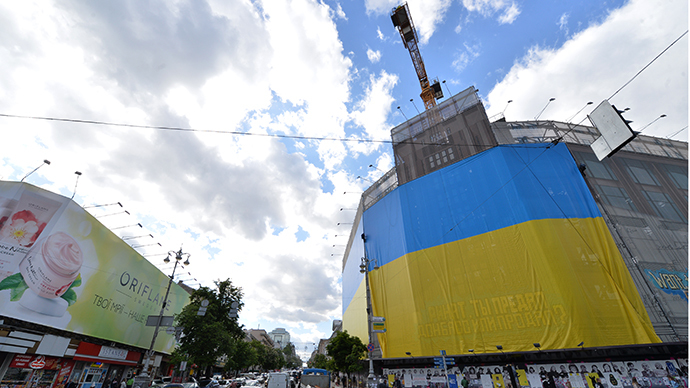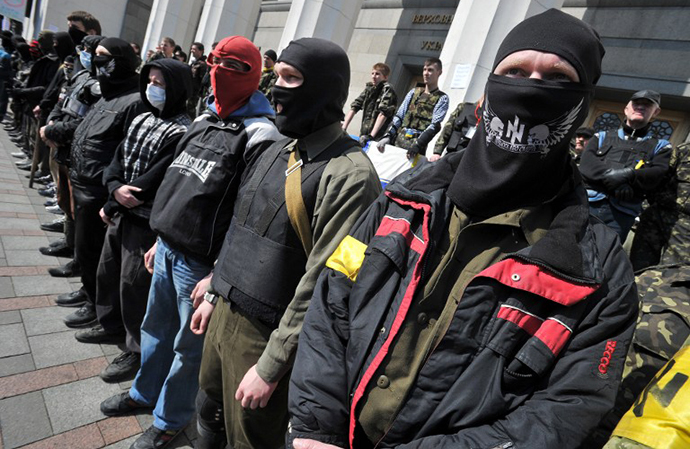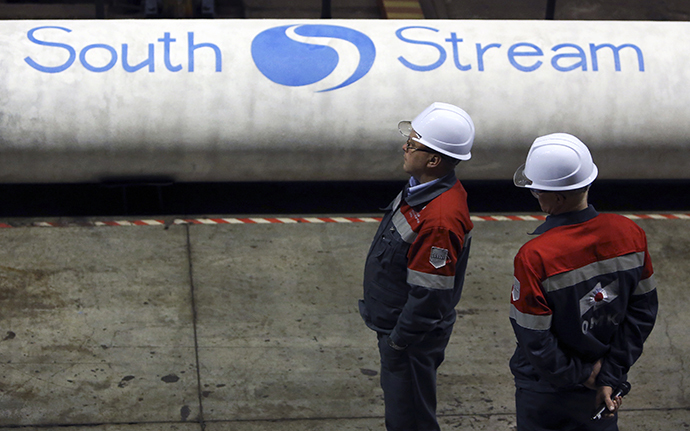The IMF goes to war in Ukraine

The IMF has approved a $17 billion loan to Ukraine. The first $3.2 billion tranche has arrived on Wednesday.
It’s essential to identify the conditions attached to this Mafia-style “loan.” Nothing remotely similar to reviving the Ukrainian economy is in play. The scheme is inextricably linked to the IMF’s notorious, one-size-fits-all “structural adjustment” policy, known to hundreds of millions from Latin America and Southeast Asia to Southern Europe.
The regime changers in Kiev have duly complied, launching the inevitable austerity package – from tax hikes and frozen pensions to a stiff, over 50 percent rise on the price of natural gas heating Ukrainian homes. The “Ukrainian people” won’t be able to pay their utility bills this coming winter.
Predictably, the massive loan is not for the benefit of “the Ukrainian people.” Kiev is essentially bankrupt. Creditors range from Western banks to Gazprom – which is owed no less than $2.7 billion. The “loan” will pay back these creditors; not to mention that $5 billion of the total is earmarked for payments of – what else – previous IMF loans. It goes without saying that a lot of the funds will be duly pocketed – Afghanistan-style – by the current bunch of oligarchs aligned with the “Yats” government in Kiev.
The IMF has already warned that Ukraine is in recession and may need an extension of the $17 billion loan. IMF newspeak qualifies it as “a significant recalibration of the program.” This will happen, according to the IMF, if Kiev loses control of Eastern and Southern Ukraine – something already in progress.
Eastern Ukraine is the country’s industrial heartland – with the highest GDP per capita and home of key factories and mines, mostly in the Donetsk region, which happens to be largely mobilized against the neo-fascist/neo-nazi-aligned regime changers in Kiev. If the current conflagration persists, this means both industrial exports and tax revenues will go down.
So here’s the IMF prescription for the oligarch bunch – some of them actively financing Right Sector militias: As long as you’re facing a popular rebellion in Eastern and Southern Ukraine, relax; you will get additional IMF cash further on down the road. Talk about a crash course in disaster capitalism.

We want you to invade
Meanwhile, the Obama administration’s juvenile delinquent school of diplomacy remains on track: the plan is to entice Moscow to “invade.” Benefits would be immense. Washington would destroy once and for all the emerging strategic partnership between the EU, especially Germany, and Russia, part of a more organic interaction between Europe and Asia; keep Europe perennially under America’s thumb; and boost Robocop NATO after its Afghan humiliation.
Well, they are not juvenile delinquents for nothing. Yet this brilliant plan forgets a key component: enough competent troops willing to apply Kiev’s designs. The regime changers dissolved the Berkut federal riot police. Big mistake – because they are pros; they are unemployed; and now, holding a monster grudge, amply supporting Ukrainians in favor of federalization.
What the Ministry of Truth script imposed on all Western corporate media insists on labeling “pro-Russian separatists” are in fact Ukrainian federalists. They don’t want to split. They don’t want to join the Russian Federation. What they want is a federalized Ukraine with strong, autonomous provinces.
Meanwhile, in Pipelineistan…
Washington is actively praying that the confrontation between the EU and Russia on the gas front spirals out of control. Natural gas will amount to 25 percent of the EU’s needs up to 2050. Since 2011 Russia is the number one supplier, ahead of Norway and Algeria.
The bureaucrat-infested European Commission (EC) is now concentrating its attacks on Gazprom on the South Stream pipeline – whose construction starts in June. The EC insists that the agreements already struck between Russia and seven EU countries infringe the laws of the EU (how come they didn’t find that out earlier?). The EC would like South Stream to become a “European,” not a Gazprom project.
Well, that depends on a lot of serious diplomacy and the internal politics of various EU member states. For instance, Estonia and Lithuania depend 100 percent on Gazprom. Some countries, such as Italy, import over 80 percent of their energy; others, such as the UK, only 40 percent.

It’s like the EC suddenly woke up from its usual torpor and decided that South Stream is a political football. Günther Oettinger, the EU’s energy commissioner, has been blaring the horn of EU competition laws called “the third energy package” – which would essentially require Gazprom to open South Stream to other suppliers. Moscow filed a complaint to the World Trade Organization (WTO).
Rigorous application of recently unearthed EU law is one thing. Facts on the ground are another. South Stream may cost up to 16 billion euros – but it will be built, even if financed by Russia’s state budget.
Moreover Gazprom, in 2014 alone, has already signed extra deals with German, Italian, Austrian and Swiss partners. Italy’s ENI and France’s EDF are partners from the start. Germany, Italy, Bulgaria, Hungary and Austria are deeply involved in South Stream. No wonder none of them are in favor of more sanctions on Russia.
As for any substantial move by the EU to find new supply sources, that’s a process that should take years – and should involve the best possible alternative source, Iran, assuming a nuclear deal with the P5+1 is struck this year. Another possible source, Kazakhstan, exports less than it could, and that will remain the case because of infrastructure problems.
So we’re back to the Ukrainian tragedy. Moscow won’t “invade.” What for? The IMF’s structural adjustment will devastate Ukraine more than a war; most Ukrainians may even end up begging Russia for help. Berlin won’t antagonize Moscow. So Washington’s rhetoric of “isolating” Russia is just revealed for what it is: juvenile delinquency.
What’s left for the Empire of Chaos is to pray for chaos to keep spreading across Ukraine, thus sapping Moscow’s energy. And all this because the Washington establishment is absolutely terrified of an emerging power in Eurasia. Not one, but two – Russia and China. Worse: strategically aligned. Worse still: bent on integrating Asia and Europe. So feel free to picture a bunch of Washington angry old men hissing like juvenile delinquents: “I don’t like you. I don’t want to talk to you. I want you to die.”
The statements, views and opinions expressed in this column are solely those of the author and do not necessarily represent those of RT.
The statements, views and opinions expressed in this column are solely those of the author and do not necessarily represent those of RT.













